About Record Keeping
"The faintest ink is better than the strongest memory." - Proverb
And... 'It's all about ME!' -Common Human Attitude
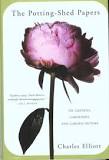 Garden writer, Charles Elliott, has an essay in his collection The Potting Shed Papers called "On Keeping Track." In helping his brother sort donations for a charity sale, he noticed a little black leather-bound volume full of clear, miniscule handwriting in blue ink.... I often think of that book and wish I had kept it. I don't know who wrote it. . . . It recorded the usual things: weather (particularly frosts), dates when significant garden events took place (the first early potatoes, new peas, lilac bloom), the names of flowers and vegetables planted. It also made note of chores that needed to be done and ideas for improving the garden, as well as comments on how some previous plans had turned out. The little book was clearly a labor of love, complied with care and attention over at least forty years by someone whose garden represented an important part of [their] life." The fact that it was in the give-away pile was poignant. Clearly the gardener had died, and with them the connection the journal had to a particular place. Those specific notes and observations, recorded so carefully, "no longer of interest to anybody at all" (p. 20-1).
Garden writer, Charles Elliott, has an essay in his collection The Potting Shed Papers called "On Keeping Track." In helping his brother sort donations for a charity sale, he noticed a little black leather-bound volume full of clear, miniscule handwriting in blue ink.... I often think of that book and wish I had kept it. I don't know who wrote it. . . . It recorded the usual things: weather (particularly frosts), dates when significant garden events took place (the first early potatoes, new peas, lilac bloom), the names of flowers and vegetables planted. It also made note of chores that needed to be done and ideas for improving the garden, as well as comments on how some previous plans had turned out. The little book was clearly a labor of love, complied with care and attention over at least forty years by someone whose garden represented an important part of [their] life." The fact that it was in the give-away pile was poignant. Clearly the gardener had died, and with them the connection the journal had to a particular place. Those specific notes and observations, recorded so carefully, "no longer of interest to anybody at all" (p. 20-1).
He found it very poignant, a reminder of the transience of gardens, and of people, and of life in general, but also a testament to the joys of observing the natural world close at hand.
About the utilitarian value to the living gardener, there can be no doubt about how valuable the practice of record keeping can be. The esteemed Christopher Lloyd, the famous British garden writer, says Elliott, "has said somewhere that you shouldn't even visit a new garden without a notebook in hand, and surely he is living proof of the wisdom of keeping track of what your own plants are doing, or not doing, under varying conditions. There may be people who can keep it all in their heads, but most of us are human. Besides, a garden journal can be, in its own modest way, a work of art, or at least something more than one of those places where facts accumulate like dead leaves in a stopped gutter" (p. 23).
Gilbert White's charming volume, The Natural History of Selborne (1789), is "a fine example of the way attention to minutiae can create something of lasting value. Needless to say, this doesn't always--or often--happen. As a rule garden diaries speak mostly to the writer him- or her- self (p. 24).
As a result of his essay, I suddenly saw ugly shortcomings in my own practices. :(
I. Usable Data -- I have not been creating it.
For example, over the last few weeks, I have been staring at the splendid patch of sunchokes along the front of the chicken yard, and thinking that surely they are bigger than I've ever seen them for late May. What did they look like last year at this time? And am I just a wowie-zowie kind of person who always thinks whatever is in front of me is new and different and exemplary?
I remember thinking that they were impressive/ maybe ahead of themselves last year. I am pretty sure I got the yard stick out and photographed them. And now, do you think I can find the stupid photos?! No! Very frustrating. It made me realize that my 'data' is NOT organized or stored in a way that lets me find things and answer questions.
Why HAVE I been taking photos and making notes all this time?!
Actually it is about being in the present, about practicing the skill of seeing what I am looking at, right in front of me, at any given moment. Taking photos helps me do that. Where is the light? What is in the frame? How many petals? What shape of leaf or stem? So if that is all I ever do, and the photos themselves vanish into thin air, it is a soul-nourishing, worthy habit. Beyond that, I have always had the goal of writing about particular growing season, trying to capture things from slightly higher up. Generalize. Evaluate. Compare and contrast. Pick out the most interesting and noteworthy things. That is something I hope to do more often. More regularly. It is pretty rewarding and often useful later. :) And now, particularly since I have things spread out over 3 aging laptops stored on creaky old hard drives, I feel the need archive my writings, notes and photos so that they become a useful bank of reference material. So I don't have to curse myself when I want to know when we planted the plum tree at the back, or how tall the sun chokes were in early spring last year.
We have a few very brave volunteer Hollyhocks on the west side (where they would get runoff from the swamp cooler on the roof if it wasn't actually performing so brilliantly). They are about 3 feet tall and full of buds. We had a few last year as well. What color were they?
I did find a photo from last summer. (!!) Answer? A lovely red.
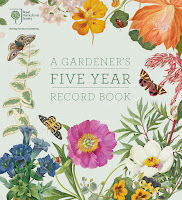 Years and years ago, my grandfather gave me a gorgeous 5-year garden journal. It was printed on heavy glossy paper and illustrated with full-color botanic plates from the Age of Empire. They probably brought it back from one of their many trips Britain. I can picture it. 2 page spread for each week, with columns for successive years. I tucked it into my growing personal library. And/ but as a single, clueless 20-something, while I admired it as gorgeous and treasured it as a gift from people I loved and admired, I had nothing to record. I wish I could snap my fingers and make it appear. And start using it.
Years and years ago, my grandfather gave me a gorgeous 5-year garden journal. It was printed on heavy glossy paper and illustrated with full-color botanic plates from the Age of Empire. They probably brought it back from one of their many trips Britain. I can picture it. 2 page spread for each week, with columns for successive years. I tucked it into my growing personal library. And/ but as a single, clueless 20-something, while I admired it as gorgeous and treasured it as a gift from people I loved and admired, I had nothing to record. I wish I could snap my fingers and make it appear. And start using it.
Ah, the Royal Horticultural Society! They still make them. I ordered a used flexible binding one for a total of $13.75. :)
II. Creative Crisis
His essay articulated something I had been worrying about, that my project trying to make short weekly yard and garden videos meant I was producing things that were only of interest to me. In a way was a very, very sad thing. Because instead continuing, which would have evolved and grown, I pretty much just stopped. I got stuck on trying to come up with something engaging & creative re. charting weather data.
To be fair, what I did was to start researching temperature--the history of thermometers, the history of what we now call meteorology, and its cousin, climate history. In a different vein, I also started thinking about outfits for my 'weather owl.' I put down a couple of tiles to mark where to put the owl and where to put the camera, so that you could see transformations over time.
Then work got super busy. Then the pandemic hit. (There's a sentence you don't see every day).
>Time to get back to it. Re-read everything. Take notes. Create a script & shot list. Then work it all through.
What is interesting about looking at the same things over and over, if they 'aren't your baby,' so to speak? History of perception. History of technology. History of science. Quirky human interest tidbits. How does this small thing relate to other larger things, or to other small things, for that matter? :)
And... 'It's all about ME!' -Common Human Attitude
 Garden writer, Charles Elliott, has an essay in his collection The Potting Shed Papers called "On Keeping Track." In helping his brother sort donations for a charity sale, he noticed a little black leather-bound volume full of clear, miniscule handwriting in blue ink.... I often think of that book and wish I had kept it. I don't know who wrote it. . . . It recorded the usual things: weather (particularly frosts), dates when significant garden events took place (the first early potatoes, new peas, lilac bloom), the names of flowers and vegetables planted. It also made note of chores that needed to be done and ideas for improving the garden, as well as comments on how some previous plans had turned out. The little book was clearly a labor of love, complied with care and attention over at least forty years by someone whose garden represented an important part of [their] life." The fact that it was in the give-away pile was poignant. Clearly the gardener had died, and with them the connection the journal had to a particular place. Those specific notes and observations, recorded so carefully, "no longer of interest to anybody at all" (p. 20-1).
Garden writer, Charles Elliott, has an essay in his collection The Potting Shed Papers called "On Keeping Track." In helping his brother sort donations for a charity sale, he noticed a little black leather-bound volume full of clear, miniscule handwriting in blue ink.... I often think of that book and wish I had kept it. I don't know who wrote it. . . . It recorded the usual things: weather (particularly frosts), dates when significant garden events took place (the first early potatoes, new peas, lilac bloom), the names of flowers and vegetables planted. It also made note of chores that needed to be done and ideas for improving the garden, as well as comments on how some previous plans had turned out. The little book was clearly a labor of love, complied with care and attention over at least forty years by someone whose garden represented an important part of [their] life." The fact that it was in the give-away pile was poignant. Clearly the gardener had died, and with them the connection the journal had to a particular place. Those specific notes and observations, recorded so carefully, "no longer of interest to anybody at all" (p. 20-1).He found it very poignant, a reminder of the transience of gardens, and of people, and of life in general, but also a testament to the joys of observing the natural world close at hand.
About the utilitarian value to the living gardener, there can be no doubt about how valuable the practice of record keeping can be. The esteemed Christopher Lloyd, the famous British garden writer, says Elliott, "has said somewhere that you shouldn't even visit a new garden without a notebook in hand, and surely he is living proof of the wisdom of keeping track of what your own plants are doing, or not doing, under varying conditions. There may be people who can keep it all in their heads, but most of us are human. Besides, a garden journal can be, in its own modest way, a work of art, or at least something more than one of those places where facts accumulate like dead leaves in a stopped gutter" (p. 23).
Gilbert White's charming volume, The Natural History of Selborne (1789), is "a fine example of the way attention to minutiae can create something of lasting value. Needless to say, this doesn't always--or often--happen. As a rule garden diaries speak mostly to the writer him- or her- self (p. 24).
As a result of his essay, I suddenly saw ugly shortcomings in my own practices. :(
I. Usable Data -- I have not been creating it.
For example, over the last few weeks, I have been staring at the splendid patch of sunchokes along the front of the chicken yard, and thinking that surely they are bigger than I've ever seen them for late May. What did they look like last year at this time? And am I just a wowie-zowie kind of person who always thinks whatever is in front of me is new and different and exemplary?
I remember thinking that they were impressive/ maybe ahead of themselves last year. I am pretty sure I got the yard stick out and photographed them. And now, do you think I can find the stupid photos?! No! Very frustrating. It made me realize that my 'data' is NOT organized or stored in a way that lets me find things and answer questions.
Why HAVE I been taking photos and making notes all this time?!
Actually it is about being in the present, about practicing the skill of seeing what I am looking at, right in front of me, at any given moment. Taking photos helps me do that. Where is the light? What is in the frame? How many petals? What shape of leaf or stem? So if that is all I ever do, and the photos themselves vanish into thin air, it is a soul-nourishing, worthy habit. Beyond that, I have always had the goal of writing about particular growing season, trying to capture things from slightly higher up. Generalize. Evaluate. Compare and contrast. Pick out the most interesting and noteworthy things. That is something I hope to do more often. More regularly. It is pretty rewarding and often useful later. :) And now, particularly since I have things spread out over 3 aging laptops stored on creaky old hard drives, I feel the need archive my writings, notes and photos so that they become a useful bank of reference material. So I don't have to curse myself when I want to know when we planted the plum tree at the back, or how tall the sun chokes were in early spring last year.
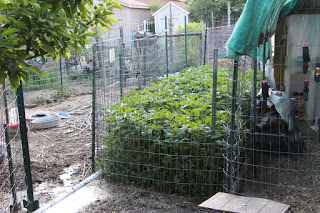 |
| 21 May 2019 |
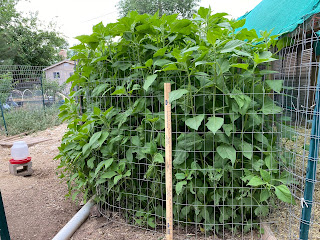 |
| 30 May 2020 |
We have a few very brave volunteer Hollyhocks on the west side (where they would get runoff from the swamp cooler on the roof if it wasn't actually performing so brilliantly). They are about 3 feet tall and full of buds. We had a few last year as well. What color were they?
I did find a photo from last summer. (!!) Answer? A lovely red.
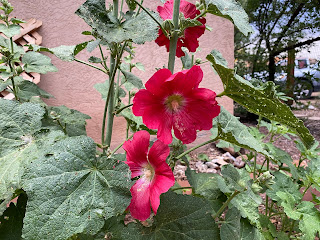 |
| 3 June 2020 |
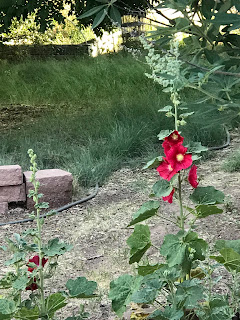 |
| Hollyhocks - 14 June 2019 |
 Years and years ago, my grandfather gave me a gorgeous 5-year garden journal. It was printed on heavy glossy paper and illustrated with full-color botanic plates from the Age of Empire. They probably brought it back from one of their many trips Britain. I can picture it. 2 page spread for each week, with columns for successive years. I tucked it into my growing personal library. And/ but as a single, clueless 20-something, while I admired it as gorgeous and treasured it as a gift from people I loved and admired, I had nothing to record. I wish I could snap my fingers and make it appear. And start using it.
Years and years ago, my grandfather gave me a gorgeous 5-year garden journal. It was printed on heavy glossy paper and illustrated with full-color botanic plates from the Age of Empire. They probably brought it back from one of their many trips Britain. I can picture it. 2 page spread for each week, with columns for successive years. I tucked it into my growing personal library. And/ but as a single, clueless 20-something, while I admired it as gorgeous and treasured it as a gift from people I loved and admired, I had nothing to record. I wish I could snap my fingers and make it appear. And start using it.Ah, the Royal Horticultural Society! They still make them. I ordered a used flexible binding one for a total of $13.75. :)
II. Creative Crisis
His essay articulated something I had been worrying about, that my project trying to make short weekly yard and garden videos meant I was producing things that were only of interest to me. In a way was a very, very sad thing. Because instead continuing, which would have evolved and grown, I pretty much just stopped. I got stuck on trying to come up with something engaging & creative re. charting weather data.
To be fair, what I did was to start researching temperature--the history of thermometers, the history of what we now call meteorology, and its cousin, climate history. In a different vein, I also started thinking about outfits for my 'weather owl.' I put down a couple of tiles to mark where to put the owl and where to put the camera, so that you could see transformations over time.
Then work got super busy. Then the pandemic hit. (There's a sentence you don't see every day).
>Time to get back to it. Re-read everything. Take notes. Create a script & shot list. Then work it all through.
What is interesting about looking at the same things over and over, if they 'aren't your baby,' so to speak? History of perception. History of technology. History of science. Quirky human interest tidbits. How does this small thing relate to other larger things, or to other small things, for that matter? :)



Comments